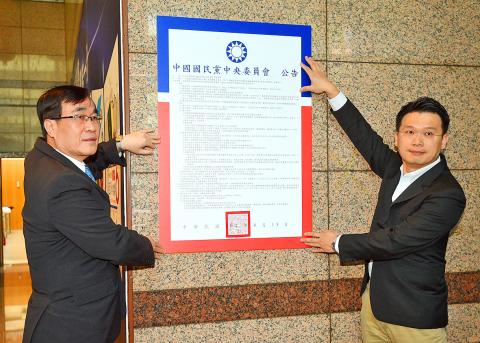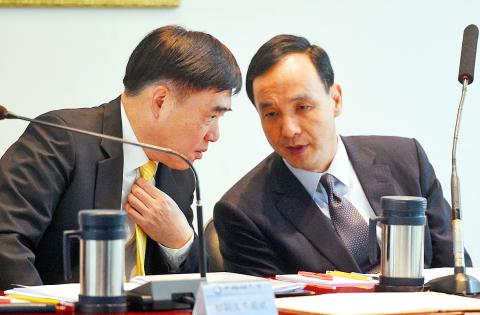New Taipei City Mayor and Chinese Nationalist Party (KMT) Chairman Eric Chu (朱立倫) yesterday reiterated his promise to serve out his mayoral term after a poll found him the most desirable presidential candidate among pan-blue supporters with a good chance to beat Democratic Progressive Party (DPP) Chairperson Tsai Ing-wen (蔡英文).
The Chinese-language United Daily News yesterday published a survey coinciding with the nomination of Tsai as the DPP’s presidential candidate.
According to the poll, which was conducted on Monday and pitted Tsai against Chu, Tsai led Chu by 8 percentage points, a narrower gap than the 13 percentage points in the newspaper’s previous survey on Feb. 8.

Photo: Wang Min-wei, Taipei Times
The latest poll showed that support for Tsai was 42 percent against 34 percent for Chu, with 24 percent undecided, compared with the poll in February that showed Tsai with a support rate of 47 percent against Chu’s 33 percent, with 20 percent undecided.
If Legislative Speaker Wang Jin-pyng (王金平) represented the KMT, Tsai had approval rating of 42 percent against Wang’s 28 percent, with 10 percent of the respondents saying neither of them was their preferred candidate, compared with 6 percent in the case of the KMT being represented by Chu, and 21 percent undecided, the poll showed.
The poll showed that Tsai had support of 57 percent if the KMT nominated Vice President Wu Den-yih (吳敦義) and 60 percent support if Deputy Legislative Speaker Hung Hsiu-chu (洪秀柱) won the KMT nomination.

Photo: Wang Min-wei, Taipei Times
Among respondents who identified themselves as supporters of the pan-blue camp, 64 percent said they wanted Chu to throw his hat in the ring, while 25 percent said they did not, according to the United Daily News report.
Forty-six percent of pan-blue supporters said that Chu should express his resolve to run for president, the report said, while 39 percent had some reservations because New Taipei City is the only municipality governed by the KMT after the party was routed in last year’s nine-in-one elections.
“I will do a good job as a mayor and complete my term,” Chu said when asked to comment on the findings of the poll, repeating earlier comments.
Elsewhere, Wang said that he did not pay attention to opinion polls, when asked about ranking behind Chu in the survey.
The KMT began its presidential nomination procedure yesterday, with the selection rules and schedule being posted at the party’s headquarters.
“As the ruling party, we still have a lot of room for improvement,” Chu said. “We will try hard to recruit young talent so the party can emerge from the bottom of the pit.”
The KMT is to nominate its presidential candidate at its party congress scheduled for the middle of July.
Results of the party primary, with members’ votes being weighted at 30 percent and a public poll at 70 percent, are to be announced on June 14.
In other news, Presidential Office spokesperson Charles Chen (陳以信) dismissed a report in the latest issue of the Chinese-language Next Magazine, which said that Chu had twice deliberately avoided answering telephone calls from President Ma Ying-jeou’s (馬英九) after the nine-in-one elections on Nov. 29 last year, when then-KMT chairman Ma was anxious to get Chu to agree to run for the chairmanship to prop the party up after he stepped down from the position.
However, Hung confirmed the report, saying she was asked by Ma to call Chu on the president’s behalf to convey the message that Ma wished him to run for chairman.
Additional reporting by CNA

Taiwanese can file complaints with the Tourism Administration to report travel agencies if their activities caused termination of a person’s citizenship, Mainland Affairs Council Minister Chiu Chui-cheng (邱垂正) said yesterday, after a podcaster highlighted a case in which a person’s citizenship was canceled for receiving a single-use Chinese passport to enter Russia. The council is aware of incidents in which people who signed up through Chinese travel agencies for tours of Russia were told they could obtain Russian visas and fast-track border clearance, Chiu told reporters on the sidelines of an event in Taipei. However, the travel agencies actually applied

Japanese footwear brand Onitsuka Tiger today issued a public apology and said it has suspended an employee amid allegations that the staff member discriminated against a Vietnamese customer at its Taipei 101 store. Posting on the social media platform Threads yesterday, a user said that an employee at the store said that “those shoes are very expensive” when her friend, who is a migrant worker from Vietnam, asked for assistance. The employee then ignored her until she asked again, to which she replied: "We don't have a size 37." The post had amassed nearly 26,000 likes and 916 comments as of this

New measures aimed at making Taiwan more attractive to foreign professionals came into effect this month, the National Development Council said yesterday. Among the changes, international students at Taiwanese universities would be able to work in Taiwan without a work permit in the two years after they graduate, explainer materials provided by the council said. In addition, foreign nationals who graduated from one of the world’s top 200 universities within the past five years can also apply for a two-year open work permit. Previously, those graduates would have needed to apply for a work permit using point-based criteria or have a Taiwanese company

The Shilin District Prosecutors’ Office yesterday indicted two Taiwanese and issued a wanted notice for Pete Liu (劉作虎), founder of Shenzhen-based smartphone manufacturer OnePlus Technology Co (萬普拉斯科技), for allegedly contravening the Act Governing Relations Between the People of the Taiwan Area and the Mainland Area (臺灣地區與大陸地區人民關係條例) by poaching 70 engineers in Taiwan. Liu allegedly traveled to Taiwan at the end of 2014 and met with a Taiwanese man surnamed Lin (林) to discuss establishing a mobile software research and development (R&D) team in Taiwan, prosecutors said. Without approval from the government, Lin, following Liu’s instructions, recruited more than 70 software